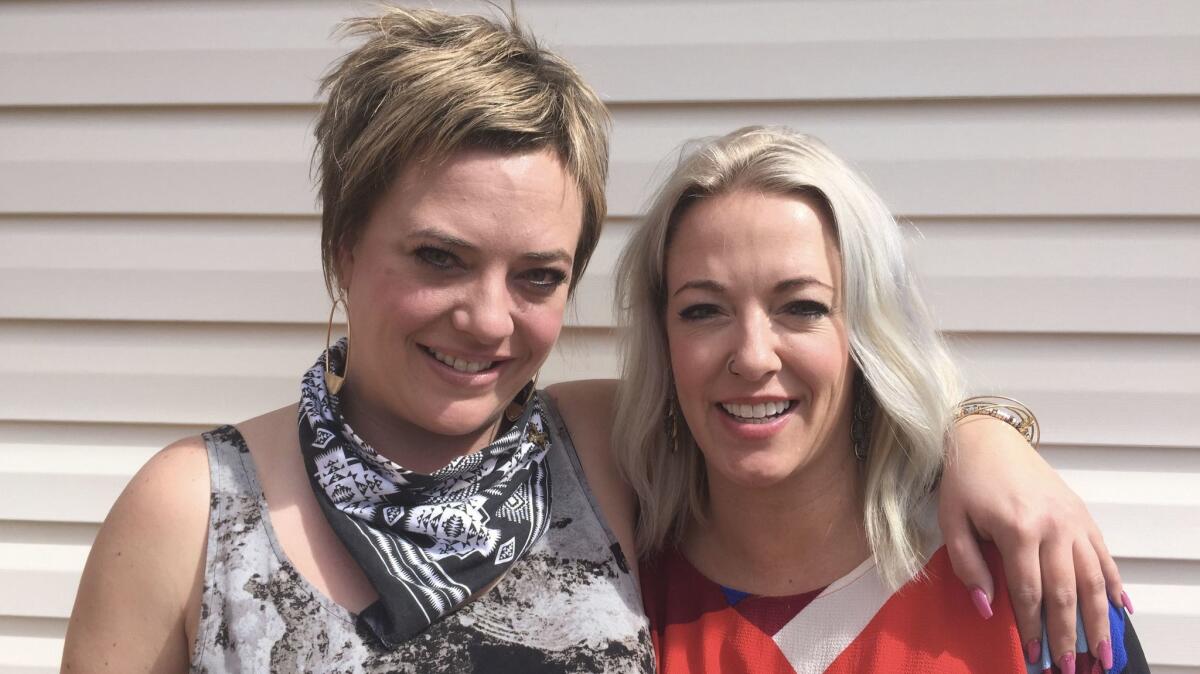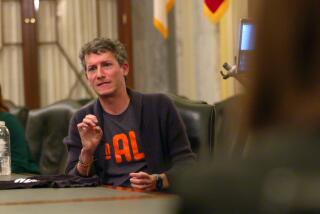One sister faces early onset Alzheimer’s. The other plans to be with her for the journey

- Share via
Reporting from Denver — Like all siblings, Robin and Jessica McIntyre have had their share of battles yet they’ve always been close. And that bond grows stronger as they contend with the exceptional cruelties life has visited upon their family.
This latest challenge may be hardest of all.
“I have probably lived more of my life than I have left,” said Robin matter-of-factly.
Robin carries the genetic mutation for early onset Alzheimer’s disease. Barring a major medical breakthrough, her chances of getting the disease are 100%. Her chances of surviving are zero. She recently turned 34, and symptoms could appear as early as age 40.
But Jessica has vowed to accompany her on that journey. When Robin was diagnosed, they made a pact. Once symptoms appear, Jessica would take care of her.
“I’m her big sister; that’s my job,” said Jessica, who is two years older. “I would do anything for her.”
Jessica lives in Colorado, Robin in Wyoming, and they recently shared their story as they sat on the sofa in Jessica’s sun-filled living room. They were still groggy after Robin’s birthday celebration the night before.
“We went to the Denver Nuggets game,” Jessica said. “And we got home very, very late.” Robin laughed wearily.
After Jessica vowed to take care of her sister, she recalled, she sought out advice from her financial planner.
“He told me, ‘You’re going to need more money,’’’ Jessica said.
Robin teared up.
“Her commitment brings a lot of relief to me. I hear stories all the time about terrible conditions that people with Alzheimer’s are living in,” she said. “I never want that to happen to me.”
Their pact is loose, unofficial, but with some specific requirements. For one, Robin wants a service dog to retrieve her clothes when she forgets them and to remind her to take her medicine.
And since both women are hairstylists, looking good is a must.
“I want my hair and makeup to look nice every day,” Robin said. “I want to maintain my dignity.”
Jessica nodded.
“We did that for my mom,” Robin continued. “She was the greatest lady ever. The hardest part was watching the sparkle go from her eye. She went vacant.”
Their mother, Lori DeMoe, was one of six siblings. Five of them carried the mutation for early onset Alzheimer’s. Over the last three generations, at least 15 DeMoe family members have been diagnosed with the disease. An additional 13 don’t know whether they have it.
Of the 5 million Americans with Alzheimer’s disease, fewer than 5% have the early onset type. The fatal disease causes abnormal clumps of proteins, known as plaques and tangles, to form in the brain, leading to the death of nerve cells that serve memory and other functions.
Researchers have studied the DeMoe family for years, looking for clues into how Alzheimer’s develops in its earliest stages.
The family is the subject of a new book by journalist Niki Kapsambelis, titled “The Inheritance: A Family on the Front Lines in the Battle Against Alzheimer’s Disease.”
“I got to know Lori really well, and I watched the dynamic unfold between Jessica and Robin,” Kapsambelis said. “They continue to blow me away by how they are dealing with this. For Robin, it’s a struggle some days, but she has deep reserves of resilience. Their mother made them the way they are.”
Lori DeMoe grew up in Tioga, N.D. She was a teacher’s aide for special-needs children while her husband Steven, 62, worked for the Union Pacific Railroad. Her rural upbringing instilled competency and self-reliance. She sewed all her kids’ Halloween costumes, knitted clothes and taught the women in her small town how to breast-feed.
After Lori’s diagnoses in 2006 at age 50, Kapsambelis asked her how she wanted to be remembered.
“I want to be remembered for being happy and for being a good mother,” she replied.
Her children, Jessica, Robin and their youngest sister, Chelsey, 31, knew they had a 50% chance of having the mutation. Jessica wanted to know immediately.
“I found out in 2006,” she said. “I felt very, very relieved, but also guilty because I had all these cousins with the gene.”
Chelsey, who lives in Wyoming, was also negative.
Robin resisted. She looked like her mom, acted like her mom and inherited her mom’s penchant for arts and crafts. She worried about what else she may have inherited.
All the while, her family was part of an Alzheimer’s study at the University of Pittsburgh. As a participant, Robin could find out whether she carried the gene mutation.
The uncertainty weighed on her. She would lose her car keys and wonder whether the disease was starting.
Her father, Steven, who has no Alzheimer’s on his side of the family, was caring for her mother in Laramie, Wyo. He urged Robin not to find out.
“At the time I didn’t know if she could handle it,” he said.
Robin made a decision.
“I needed to know so I could move forward,” she said.
In 2012, she sat in a conference room at the University of Pittsburgh with Jessica and her aunt awaiting the results. A genetic counselor came in.
Robin had the mutation.
She cursed and broke into tears. No one knew what to say.
Jessica finally blurted out, “I’ll carry a baby for you.”
Robin declined the baby, but the pact was born. Details would come later.
Time took on a new urgency now. Robin quit doing things she didn’t like. She ended an unhappy five-year relationship, left her job in a Denver chiropractor’s office and moved to Laramie to be a hairstylist and help take care of her mother.
Lori was declining fast. Her memory was fading; she wrecked the car and grew increasingly combative.
The family decided to put her in a long-term care facility in Tioga. She refused. Steven told her she was needed for a research project involving her brother who was in the same facility. As sick as she was, she jumped at the chance to be part of something that might lead to a cure. Except it wasn’t true.
“Basically we lied to her, but sometimes you have to do that with Alzheimer’s,” Steven said. “They won’t go into a facility willingly.”
Lori died last year at age 56.
Robin had kept her diagnosis secret from her dad, not wanting to burden him as he struggled with her mother. Two months after her mother’s death she told him.
“My heart broke,” he said. “It’s an odd feeling to know your daughter will not live as long as you will. I thought I had two out of three daughters safe and one more to go. I hoped to bat a thousand.”
The family’s experience with the disease has left Robin and Jessica with few illusions.
“You don’t go gracefully when you have Alzheimer’s,” Robin said. “My biggest fear is that they won’t find a cure, and I’ll go through what my mom went through.”
Jessica believes she’s ready for what may be coming.
“I can say that for certain,” she said. “I have already seen it. It happens slowly, not overnight.”
The two have recently been traveling the country to give talks and raise awareness about Alzheimer’s.
So far, Robin has no symptoms. She’s part of a clinical trial involving people certain to get early onset Alzheimer’s and receives the drug gantenerumab, which she hopes will prevent or slow down the disease.
Researchers are giving the drug or a placebo to participants before symptoms start.
“We are hoping it will prevent the abnormal amyloid plaque from accumulating in the brain,” said Dr. Sarah Berman, an associate professor of neurology who heads up the trial site at the University of Pittsburgh. “This is a very exciting trial because we have never had anything that might possibly prevent this devastating disease.”
Robin gets an injection each month. Every other month she comes to Denver for an MRI. Once a year she goes to the University of Pittsburgh for three days of tests, including a lumbar puncture, half a dozen brain scans, and cognitive testing and mental exams.
The tests are grueling but offer a glimmer of hope.
“I am planning my future like any normal person,” she said. “I plan to be the first survivor of Alzheimer’s disease.”
Kelly is a special correspondent.
Click here for a Spanish version of this story
More to Read
Sign up for Essential California
The most important California stories and recommendations in your inbox every morning.
You may occasionally receive promotional content from the Los Angeles Times.










